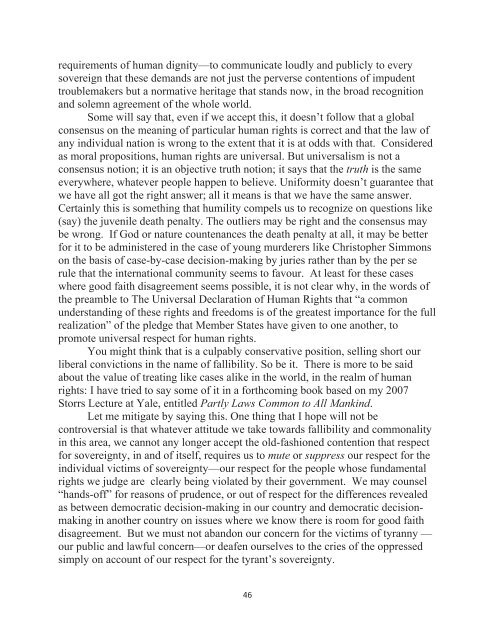International Legal Evangelism: Intelligence, Reconnaissance & Missions
International Legal Evangelism: Intelligence, Reconnaissance & Missions
International Legal Evangelism: Intelligence, Reconnaissance & Missions
You also want an ePaper? Increase the reach of your titles
YUMPU automatically turns print PDFs into web optimized ePapers that Google loves.
equirements of human dignity—to communicate loudly and publicly to every<br />
sovereign that these demands are not just the perverse contentions of impudent<br />
troublemakers but a normative heritage that stands now, in the broad recognition<br />
and solemn agreement of the whole world.<br />
Some will say that, even if we accept this, it doesn’t follow that a global<br />
consensus on the meaning of particular human rights is correct and that the law of<br />
any individual nation is wrong to the extent that it is at odds with that. Considered<br />
as moral propositions, human rights are universal. But universalism is not a<br />
consensus notion; it is an objective truth notion; it says that the truth is the same<br />
everywhere, whatever people happen to believe. Uniformity doesn’t guarantee that<br />
we have all got the right answer; all it means is that we have the same answer.<br />
Certainly this is something that humility compels us to recognize on questions like<br />
(say) the juvenile death penalty. The outliers may be right and the consensus may<br />
be wrong. If God or nature countenances the death penalty at all, it may be better<br />
for it to be administered in the case of young murderers like Christopher Simmons<br />
on the basis of case-by-case decision-making by juries rather than by the per se<br />
rule that the international community seems to favour. At least for these cases<br />
where good faith disagreement seems possible, it is not clear why, in the words of<br />
the preamble to The Universal Declaration of Human Rights that “a common<br />
understanding of these rights and freedoms is of the greatest importance for the full<br />
realization” of the pledge that Member States have given to one another, to<br />
promote universal respect for human rights.<br />
You might think that is a culpably conservative position, selling short our<br />
liberal convictions in the name of fallibility. So be it. There is more to be said<br />
about the value of treating like cases alike in the world, in the realm of human<br />
rights: I have tried to say some of it in a forthcoming book based on my 2007<br />
Storrs Lecture at Yale, entitled Partly Laws Common to All Mankind.<br />
Let me mitigate by saying this. One thing that I hope will not be<br />
controversial is that whatever attitude we take towards fallibility and commonality<br />
in this area, we cannot any longer accept the old-fashioned contention that respect<br />
for sovereignty, in and of itself, requires us to mute or suppress our respect for the<br />
individual victims of sovereignty—our respect for the people whose fundamental<br />
rights we judge are clearly being violated by their government. We may counsel<br />
“hands-off” for reasons of prudence, or out of respect for the differences revealed<br />
as between democratic decision-making in our country and democratic decisionmaking<br />
in another country on issues where we know there is room for good faith<br />
disagreement. But we must not abandon our concern for the victims of tyranny —<br />
our public and lawful concern—or deafen ourselves to the cries of the oppressed<br />
simply on account of our respect for the tyrant’s sovereignty.<br />
<br />
46

















